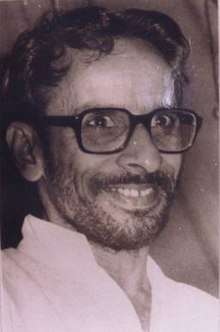K. V. Subbanna
Kuntagodu Vibhuthi Subbanna (20 February 1932 – 16 July 2005) was an acclaimed dramatist and writer in Kannada. He was the founder of the world-famous NINASAM (Neelanakantheshwara Natya Sangha) drama institute.[1] Founded in 1949 in Heggodu, Sagara. Ninasam, under the guidance of K.V. Subbanna, made significant contribution to Kannada theatre and other performing arts.[1] He was awarded, in 1991, the Ramon Magsaysay Award for Journalism, Literature, and Creative Communication Arts,[2] in recognition of his contribution to enrich rural Karnataka with the world's best films and the delight and wonder of the living stage. He was awarded the Padma Shri during 2004–05.
K.V. Subbanna | |
|---|---|
 | |
| Born | 20 February 1932 Heggodu, Sagara, Karnataka, India |
| Died | 16 July 2005 (aged 73) Heggodu, Sagara, Karnataka |
| Occupation | Playwright, theatre, writer, |
| Genre | Fiction |
| Literary movement | Navya |
| Children | K. V. Akshara |
Under the influence of Shantaveri Gopala Gowda, a senior leader of the socialist movement in Karnataka, Subbanna espoused socialist ideology, to which he was committed throughout his life.[3] To promote Kannada dramas Subbanna set up training centres in various parts of Karnataka. He also established Akshara Prakashana, a publishing house, to publish literature in Kannada related to theatre, which included translations of plays from other languages. His son K. V. Akshara is also a playwright.
Awards and recognition
- Ramon Magsaysay Award in 1991
- Sangeet Natak Akademi Award in 1994
- Sahitya Akademi Award in 2003[4]
- Padma Shree in 2004[5]
Notes
- History of Ninasam is explained by "Chaman Ahuja". "Committed to culture and creativity". Online Edition of The Tribune, dated 1999-02-14. 1999, The Tribune. Retrieved 14 April 2007.
- 1991 Ramon Magsaysay Awardee for Journalism, Literature, and the Creative Communication Arts – K. V. Subbanna
- "'At this age, I am learning more from others'". Online webpage of The Times of India. The Times of India. 12 May 2004. Retrieved 15 July 2007.
- "K V Subbanna honoured with State Sahitya Academy award". Deccan Herald. 10 April 2004. Archived from the original on 4 March 2016. Retrieved 28 September 2012.
- "Archived copy". Archived from the original on 23 October 2006. Retrieved 15 October 2006.CS1 maint: archived copy as title (link)